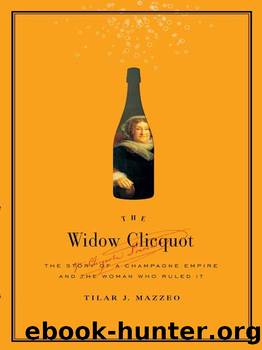The Widow Clicquot (P.S.) by Tilar J. Mazzeo

Author:Tilar J. Mazzeo
Language: eng
Format: mobi
Publisher: HarperCollins
Published: 2008-10-15T21:00:00+00:00
After her stunning coup in Russia, Barbe-Nicole discovered that she had a new set of problems. Increasingly, it was production that worried her. With Louis in Saint Petersburg capitalizing on their success, the orders were rolling in. The problem was how she was ever going to fill them. “It is cruel,” Louis wrote, “to have to refuse orders, as I am going to have to start doing, when I am easily able to place twenty or thirty thousand bottles.”
The weather was not cooperating. The harvest in the autumn of 1815 was dismal, which was sure to lead to a supply crunch when the bottles came to market in 1817. More immediate for the local peasantry, crop failure meant the distinct possibility of starvation. The situation was so grave that Barbe-Nicole’s father led a fund-raising charity campaign among the local businessmen to help feed the poor, raising 60,000 francs—well over $1 million. The local entrepreneurs had good reason to pay attention to the workers’ plight, Barbe-Nicole in particular. Winemaking was a labor-intensive undertaking. By winter, grain was impossible to come by in the markets, and the countryside had become dangerous. She knew there would be problems in the fields again in the spring. Her problems were small compared with those faced by her vignerons, of course. But for her they were troublesome enough, because by the beginning of 1816 there simply wasn’t any finished champagne left in the cellars. She had sold all her reserves. After years of struggling just to stay in business, nothing was more frustrating than having to turn away orders. Worse, without champagne to send, Barbe-Nicole knew that she risked losing all the customers her daring adventures had won her, just at the moment when her sparkling wine was becoming a recognized luxury product in the world market. She needed champagne—excellent champagne—and she needed it fast.
But there is no hurrying the birth of a great wine. Standing grim-faced in the dim light of her cellars, Barbe-Nicole knew that her only real hope was in finding a way to solve the worst production bottleneck: the tedious delays in disgorging the wines. During the secondary fermentation, when sugar and yeast were added to the bottle to make the wine sparkle, the new champagne was left with a layer of sedimentary gunk. All the traditional methods of removing the debris had drawbacks. Transvasage—pouring the wine from one bottle to another—destroyed some of the sparkle and wasted too much good wine. Meanwhile, the elaborate techniques of disgorging bottles that had been stored on their sides by tilting and shaking them, however gently, was costing her a fortune in labor, and—worst of all—it took forever. Filtering with a colle spoiled the quality of the champagne, and in the hands of some winemakers it was positively dangerous. As Robert Tomes tells the story in The Champagne Country (1867), “The old way, which involved knocking the bottles upside down to settle the sediment, used drugs and clarifiers that could be poisonous, [and] took many months.
Download
This site does not store any files on its server. We only index and link to content provided by other sites. Please contact the content providers to delete copyright contents if any and email us, we'll remove relevant links or contents immediately.
Blood and Oil by Bradley Hope(1558)
Wandering in Strange Lands by Morgan Jerkins(1417)
Ambition and Desire: The Dangerous Life of Josephine Bonaparte by Kate Williams(1383)
Daniel Holmes: A Memoir From Malta's Prison: From a cage, on a rock, in a puddle... by Daniel Holmes(1328)
Twelve Caesars by Mary Beard(1313)
It Was All a Lie by Stuart Stevens;(1294)
The First Conspiracy by Brad Meltzer & Josh Mensch(1167)
What Really Happened: The Death of Hitler by Robert J. Hutchinson(1154)
London in the Twentieth Century by Jerry White(1145)
The Japanese by Christopher Harding(1130)
Time of the Magicians by Wolfram Eilenberger(1125)
Twilight of the Gods by Ian W. Toll(1115)
Cleopatra by Alberto Angela(1093)
A Woman by Sibilla Aleramo(1092)
Lenin: A Biography by Robert Service(1073)
John (Penguin Monarchs) by Nicholas Vincent(1068)
The Devil You Know by Charles M. Blow(1024)
Reading for Life by Philip Davis(1023)
The Life of William Faulkner by Carl Rollyson(980)
